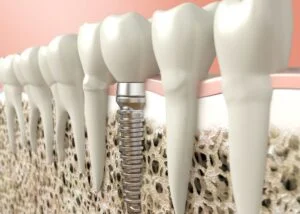 The team at Harmony Dental Care has given patients so much to smile about over the years. Thanks to crowns, bridges, and dentures supported by dental implants, people can bite, chew, and smile with restored confidence.
The team at Harmony Dental Care has given patients so much to smile about over the years. Thanks to crowns, bridges, and dentures supported by dental implants, people can bite, chew, and smile with restored confidence.
In order to achieve the best results with dental implants, oral hygiene is key. If a patient with dental implants experiences gum disease or any sort of inflammation, it can lead to serious problems.
Infection Can Put Dental Implants at Risk
If you suffer from an infection after undergoing surgery for dental implants, that can put the entire treatment at risk. The infection can lead to slower healing and poor healing, not to mention potential problems with the implant fusing with the tissues of the mouth.
This problem can happen in the months following oral surgery or years down the road as a result of gum disease and advanced tooth decay. Whatever the case may be, this puts your dental implants and general wellness at risk.
About Peri-Implantitis
Peri-implantitis is a term that specifically refers to infection of the gum tissue that spreads to other tissues that support dental implants. As the infection spreads from the gums to the bone, it can undermine the hard tissue support for the dental implants.
Peri-implantitis means greater likelihood of implants feeling loose or not being as stable as they ought to be. The infection can also lead to damage to your jawbone and major issues for your overall health and wellness.
Signs and Symptoms of Peri-Implantitis
The most common signs and symptoms of peri-implantitis are very similar to those of gum disease:
- Redness of the gums
- Gum discoloration
- Swollen gums
- Bleeding gums
- Bad breath
In later stages of the condition, peri-implantitis causes bone loss and makes dental implants and implant-supported appliances feel looser. People who experienced tooth loss as a result of serious gum disease (periodontitis or advanced periodontitis) are more likely to suffer from peri-implantitis.
Tips for Preventing Peri-Implantitis as You Recover
The best way to prevent peri-implantitis in the early months of recovery is to follow all of your post-op instructions to the letter. Be sure to be attentive when it comes to oral hygiene and proper dental care. Avoid smoking and tobacco products as these can increase your risk of infection, and attend all followup visits with your oral surgeon and routine checkups with your dentist.
By doing this, you will improve the chances of success dental implants treatment.
Gum Disease and Peri-Implantitis After Full Recovery
As note above, the danger of infection needs to be taken seriously even after your jawbone is fully healed and the implants have fused with the tissues of your mouth. Advanced gum disease years down the line can lead to implant failure. If you develop gum disease, early treatment can prevent the inflammation from affecting your bone tissue and dental implants.
Treating Gum Disease and Peri-Implantitis
Typically it is best to get the infection under control first. This usually involves the use of antiseptic rinses and sometimes antibiotic medications. Damaged soft tissue can be replaced with grafting procedures. These surgeries rebuild the gumline using donor tissue or artificial grafts. If bone loss has occurred, bone grafting procedures may be discussed to address issues with implant stability and future viability.
Learn More About Implant Dentistry
For more information about dental implants and how they can help you have a healthy and beautiful smile, be sure to contact our advanced dental care center today. Our team looks forward to your visit and discussing how we can may the implant dentistry process successful.